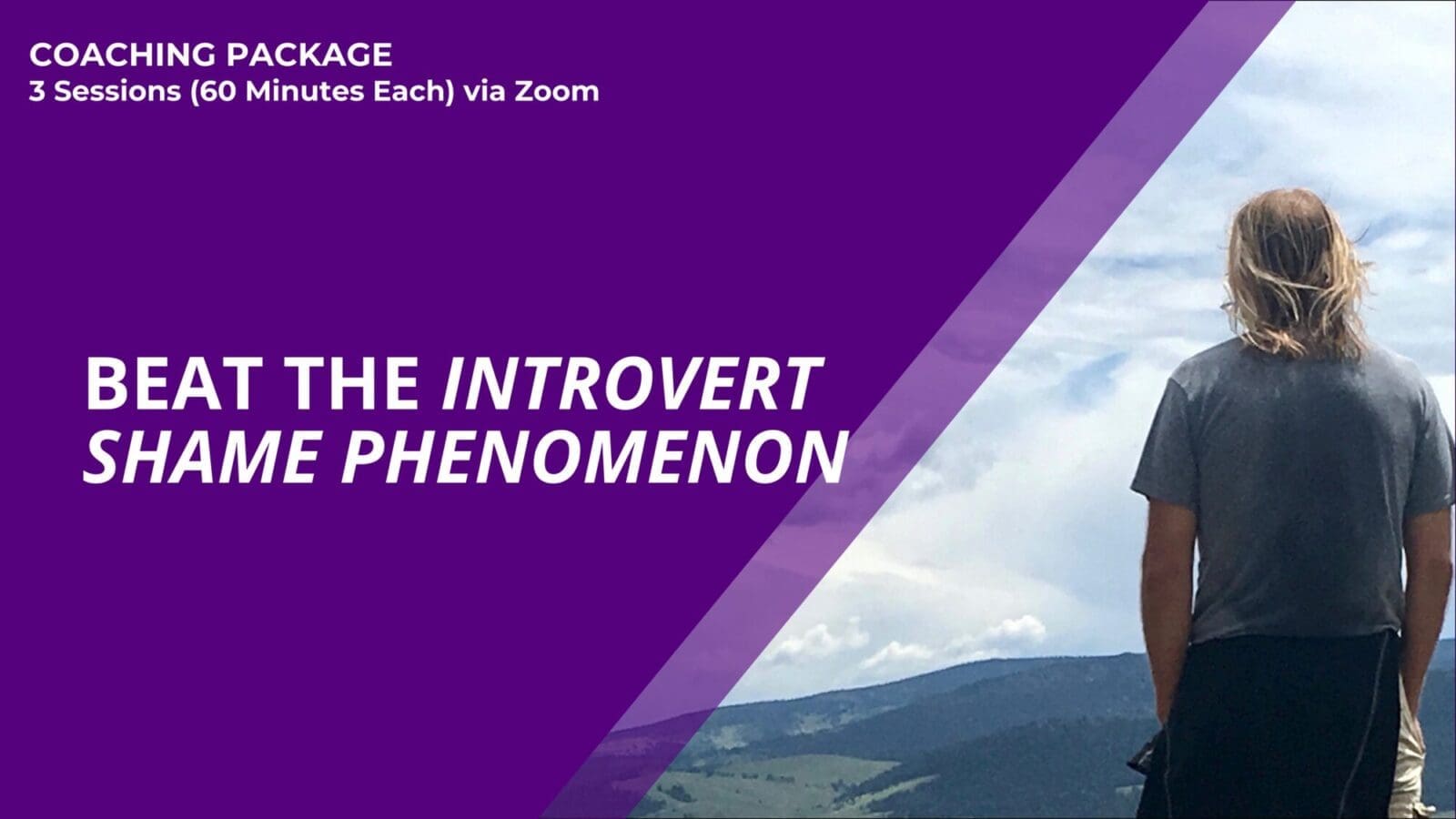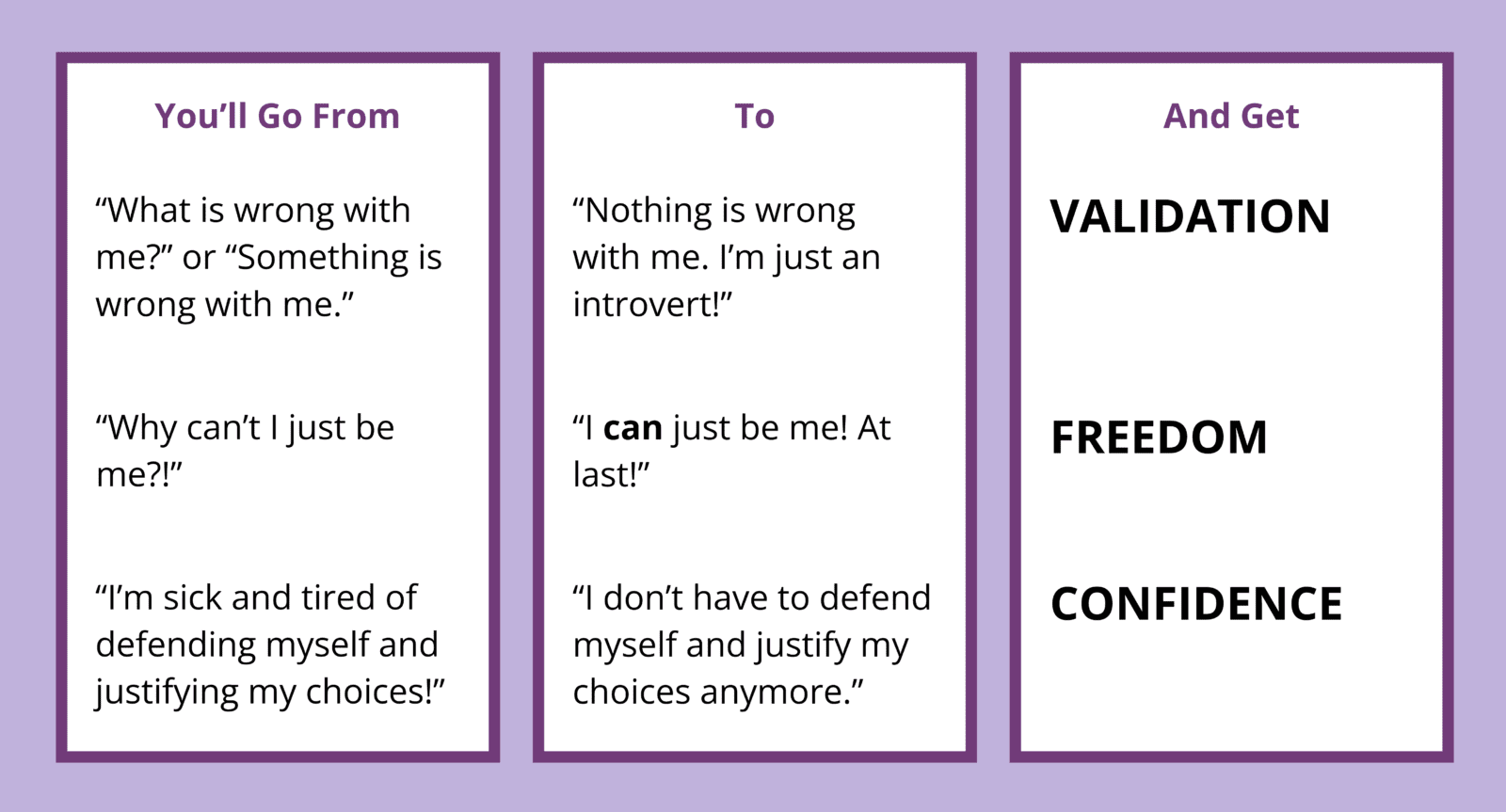Beat Introvert Shame—Coaching Package
Are you an
INTROVERT
who’s spent your whole life believing—and being told—that something’s wrong with you and your way of being?
You can make it stop.
and
START LIVING THE WAY YOU DAMN WELL WANT TO. AND DESERVE TO.
Without constantly defending yourself,
justifying your decisions, or
apologizing for who you are.
Sign Up Now in 3 Easy Steps
- Click on your preferred payment option below.
- Complete the simple form that appears and make your payment.
- Watch your email for a link to schedule your first meeting—and for all the rest of the details.
OR
Fellow introvert,
I don’t know you, but if you’ve decided to read this letter there’s one thing I know about you:
You get nonstop shit for being an introvert.
And you have for years.
Decades.
Your whole damn life.
People treat you like there’s something wrong with you—they think you need to be straightened out, fixed—simply and solely because you’re an introvert.
It’s been happening for so long now, in fact, and so relentlessly, that you might very well think the same thing yourself at this point.
Even you might wonder:
What is wrong with me?
Or maybe you’ve already reached a painful verdict:
Something is wrong with me.
Can Anybody Blame You for Asking “What Is Wrong with Me?”
I’m sorry you feel the way you feel, fellow introvert.
Truly.
I’m an introvert too, and I know what it’s like—firsthand—to ask yourself, almost in desperation: “What is wrong with me?”
So do millions of other introverts around the world.
You’re not alone. Far from it.
Let me ask you this, though:
Can anybody really blame you for asking this painful question?
I mean, isn’t it only logical?
Look at what you’re up against each day as an introvert living in this extroverted world of ours. (And remember: You’ve been dealing with it for years, decades.)
You’re constantly having to defend, justify, even apologize for yourself and your decisions.
There’s all the condescending questions:
- “Why don’t you talk more?”
- “Why are you so quiet?”
- “Why this, why that? How come this, how come that?“
And all the condescending opinions:
- “You think too much.”
- “You never talk.”
- “You don’t ___ enough. You’re too ___. You should ___ more.“
All of it unsolicited, no less.
You’re constantly being labeled—behind your back and right to your face—as somehow not normal.
- The extroverts in your life get happy, positive descriptors like outgoing and gregarious and sociable and friendly and life of the party.
- You get withdrawn and shy and stuck up and antisocial and the dreaded interesting.
- And of course loner and hermit.
Ugh.
You’re constantly misunderstood.
Examples:
- You’re sitting at the coffee shop—just staring into space, committing the crime of thinking deeply—when a friend sees you and asks, “What’s wrong?!”
- You spend the entire hour of a critical work meeting listening closely to what’s being discussed, taking detailed notes and silently pondering all the ramifications. You’re far more attentive than the person sitting next to you, who offers a phoned-in comment here and there but spends the rest of the time on his phone. Yet later in the day, you’re the one your boss calls into her office for a lecture on being “more of a team player.”
- You get home on Friday afternoon after an awful week on the job and all you want to do is sit and veg. You just … need … peace. You need not to be needed. But your significant other and your kids and the dog and the cat all vie for your attention anyway, milliseconds after you walk through the door. You respond by lashing out in frustration. And everybody ends up pissed at you for being such an asshole.
You’re constantly being nagged—subtly and not at all subtly—to change. To stop this introvert nonsense and become the extrovert you’re freakin’ supposed to be.
You’re told:
- You just have to “put yourself out there!” and “come out of your shell!”
- You just have to “get over” your introversion and “fake it ’til you make it!”
- You just have to this, you just have to that.
God!
Is it any wonder you want to just haul off and punch somebody?
Or
SCREAM?
How Come Extroverts Aren’t Constantly Asking Themselves “What Is Wrong with Me?”
Here’s a question you’ve probably never thought about—because it’s one that nobody seems to think about:
How come extroverts don’t get shit
for their extroversion?
Think of how ridiculous it would be if extroverts had to deal with unsolicited questions like:
- “Why don’t you be quiet more?”
Or unsolicited opinions like:
- “You think too little.”
Think of how ridiculous it would be if extroverts got labels not like outgoing and sociable and life of the party but instead labels like needy and oversharing and seriously lacking a fucking filter.
Think of how ridiculous it would be if extroverts had to deal with bosses who wanted them to be “more of an individual player.”
Think of how ridiculous it would be if extroverts were pressured—subtly and not at all subtly—to “get over” their extroversion.
Ha!
None of this ever happens, of course. And it never would. Or will.
Which raises a potentially life-altering question.
The fundamental question I hope you’ll ask yourself right now:
Why are things this way?
Western Culture Reveres Extroverts and Extroversion
The answer is straightforward, albeit ridiculously unfair:
Our world—Western culture in particular—worships extroverts and extroversion.
It puts extroverts and extroversion on a pedestal.
Introverts and introversion?
Not so much—as you surely know.
In fact:
Our world—Western culture in particular—disparages introverts and introversion.
It’s a strange and unjust—but undeniably real—phenomenon that author Susan Cain, in her bestselling book Quiet: The Power of Introverts in a World That Can’t Stop Talking, refers to as the extrovert ideal:
“the omnipresent belief that the ideal self is gregarious, alpha, and comfortable in the spotlight.”
Laurie Helgoe, author of Introvert Power: Why Your Inner Life Is Your Hidden Strength, calls this same concept the extroversion assumption—the maddening societal view that:
“extroversion is normal and introversion is a deviation.”
I call this imbalance the extroversion default—the idea that:
“the default personality in Western culture is, or ought to be, extroversion—and that introversion is that “other” way of being (and not in a good way).”
It all adds up to a one-sided core belief that permeates Western society—to your daily detriment as an introvert:
Extroversion is superior.
Introversion is inferior.
Extroversion is desirable.
Introversion is undesirable.
Being an extrovert is the right way to be.
Be an introvert is the wrong way to be.
In other words, here’s the unquestioned rule that Western society strictly enforces:
Extroverts get to be themselves.
Introverts need to change themselves.
You’re Not Crazy
I bring all of this up not to bitch and moan about it, or to engage in the poor-me’s.
I bring it up with you simply to name it, and to acknowledge it as real.
Let me be as explicit and crystal clear as I can be with you, fellow introvert:
Your eyes and ears are not deceiving you.
You’re not imagining things.
You’re not nuts.
You’ve been hearing negative messages about introverts and introversion—and therefore yourself—on a repeating daily loop for years now.
Decades.
Your whole damn life.
Through the voices of others and from the echoing voices in your own head.
Even if you don’t consciously know it—which is very likely the case—this relentless flood has taken a hell of a toll on you.
It has caused—and it continues to cause—a form of chronic pain that none of us humans ever want to talk about or even think about, let alone go through.
It’s not the kind of chronic pain you typically hear about, like chronic pain in your back or your shoulders or your knees.
It’s chronic pain in your head.
And in your heart.
And in your soul.
And it comes in the form of one of the worst emotions we experience as human beings, one that makes us feel like we don’t belong—which is perhaps the worst fear we have as human beings.
What emotion am I talking about?
SHAME
More precisely:
The shame you experience
simply and solely for being an introvert
in this extroverted world of ours.
What Is Shame, and Why Should You Care?
Shame sounds like a complicated thing.
But it isn’t.
It’s actually easy to grasp—way more concrete than you might think.
In her illuminating book I Thought It Was Just Me (But It Isn’t): Making the Journey from “What Will People Think?” to “I Am Enough,” renowned shame researcher Brené Brown gives us a readily understandable definition of shame by contrasting it with another emotion we all know well: shame’s first cousin, guilt.
Here’s how Brown distinguishes the two:
Guilt = I did something bad.
Shame = I am bad.
You feel guilt when you think there’s something wrong with what you’ve done. Guilt is connected to how you’ve acted, how you’ve behaved.
You feel shame, on the other hand, when you think there’s something fundamentally wrong with you.
Shame is about you, as a person.
In plain language:
Shame isn’t “I fucked up.”
It’s “I’m fucked up.”
The Introvert Shame Phenomenon
If you’ve read this far, you likely carry around with you each day a unique form of shame that is directly connected to your introversion:
You think something’s wrong with you
simply and solely because you’re an introvert.
I call this form of shame the Introvert Shame Phenomenon.
And while it routinely goes undetected and unrecognized, it is pervasive among us introverts.
And I mean pervasive.
Want proof?
Go on Amazon.com sometime and start reading the reviews of Susan Cain’s bestselling book I mentioned earlier—Quiet: The Power of Introverts in a World That Can’t Stop Talking.
Take special note of how many of the review writers offer up some variation of this phrase:
“I’ve always asked myself: ‘What is wrong with me?'”
Do the same thing for other high-profile introvert-focused books there, such as Laurie Helgoe’s Introvert Power and/or Marti Olsen-Laney’s The Introvert Advantage: How to Thrive in an Extrovert World.
Then—as I have done and continue to do to this day—read the hundreds, thousands of articles written by and about introverts who’ve been shamed for their introversion their whole lives, and who have come to believe all the negative messages they’ve gotten about themselves.
And then—as I have also done and continue to do to this day—read the hundreds, thousands of academic studies on introverts and their challenges in an extroverted society.
OK, you probably don’t have the time or inclination to do all of that. Understandable!
Let me save you the trouble.
Here—with a tip of the hat to Oprah—is what I know for sure:
The Introvert Shame Phenomenon
is real, fellow introvert.
And it harms.
Deeply.
Exhaustively.
And insidiously.
To be even more specific—to bring it all back to you:
The Introvert Shame Phenomenon
is what’s hurting you so much right now, fellow introvert.
It’s your problem.
It’s the underlying issue that
you need to address in your life.
I offer you this diagnosis based on my more than 25 years of research on introverts and introversion—and, especially, on my 57 years (and counting!) of personal experience as an introvert living in this extroverted world of ours.
From this diagnosis, the treatment naturally follows.
What is it?
Beat the Introvert Shame Phenomenon.
The “Beat the Introvert Shame Phenomenon” Coaching Package
Conquering your introversion-related shame, of course, is easier said than done in this extroverted world of ours, especially in Western society.
If it were easy, after all, you’d be doing it already. Right?
But it’s still the way forward.
Because here’s the bottom line, the unassailable truth about the pain you’re in right now and how to not only stop it, but replace it with self-assurance, good health, and sustainable happiness:
Either on your own or with some help, it’s imperative for you to acknowledge and then deal with the Introvert Shame Phenomenon in your life.
If you’d like some help with this—if you could use some structured, empathetic guidance from a fellow introverted traveler, so that you don’t have to go it alone—I have something that may be a good fit for you.
It’s a three-session (60 minutes each), semi-structured individual coaching package called:
Sign Up Now in 3 Easy Steps
- Click on your preferred payment option below.
- Complete the simple form that appears and make your payment.
- Watch your email for a link to schedule your first meeting—and for all the rest of the details.
OR
Here are the details, so that you can gauge whether it’s a fit for you and your needs and goals.
Session 1—Shame, the Introvert Shame Phenomenon, and You
What is shame? What is the Introvert Shame Phenomenon? Where do shame and the Introvert Shame Phenomenon come from in the first place?
And most importantly, what is the impact on you?
We cover it all in this first session together, so that you not only know exactly what you’re dealing with—which, by itself, is a crucial step forward—but also why it’s happening and why its insidiousness makes it so difficult to see in your own life.
Session 2—Shame Resilience Strategies for Introverts
Once you know what you’re dealing with and why when it comes to your introversion-related shame, what—specifically—can you do about it in your own daily life?
In this second session together, we talk about what shame expert Brené Brown calls shame resilience strategies, as applied to your introversion-related shame (i.e., the Introvert Shame Phenomenon) specifically.
We look at what you can do in acute cases (i.e., in the literal moment you’re experiencing a bout with introversion-related shame) and in the long term (i.e., in your life in general, particularly in terms of shame prevention and shame impact reduction).
Session 3—Applying Introvert Shame Concepts to Your Daily Life
In this third and final session together, we take everything we’ve covered in the first two sessions and apply it to your complex life, with all of its unique barriers, struggles, relationships, and situations.
This session is where we really stress the idea of individual in individual coaching!
You have your own unique life experiences and circumstances, after all—including the unique key people in your life—to deal with where your introversion-related shame is concerned.
So the only way to take all the lessons you’ve learned in the first two sessions and apply them to your particular life is for us to talk everything through together, focusing on the concerns you see as most critical to address.
No More “What Is Wrong with Me?”
What—specifically and concretely—will you get from the time, energy, and money you invest in the “Beat the Introvert Shame Phenomenon” coaching package?
It all boils down to three main tangible outcomes—changes you’ve likely been craving for years, even if you haven’t been consciously aware of it:
Is the “Beat the Introvert Shame Phenomenon” Coaching Package a Fit for You?
The “Beat the Introvert Shame Phenomenon” coaching package isn’t for everyone.
But if it’s a fit for you, you will surely know it.
Is it a fit for you?
Here’s a handy (and brutally honest) chart to help you decide:
What Happens If You Do Nothing?
You may be wondering, understandably so: What happens if you just sit tight for now?
In other words:
What happens if you do nothing about the Introvert Shame Phenomenon in your life?
There is only one honest answer to this question:
We don’t know for sure.
We can’t, really.
None of us can predict the future with 100% certainty or accuracy, after all.
What we can do, though, is let logic and common sense do their usual good work in our analysis of the situation and the decisions we ultimately make about it.
There are only three possible outcomes from doing nothing about your struggle with the Introvert Shame Phenomenon:
- Things get better for you. This is possible; it’s not impossible. But generally speaking it defies both logic and common sense. Doing nothing about a situation typically does not lead to improvement in said situation. So of the three possible outcomes, this one is the least likely.
- Things stay the same for you. This is considerably more likely than things getting better, from the standpoint of logic and common sense. It’s probably fair, in fact, to say that this is—at a minimum—reasonably likely. Keeping in mind, of course, that this is where you are now—which, presumably, is a place of frustration and pain that you don’t like and don’t want to maintain.
- Things get worse for you. If you think of the Introvert Shame Phenomenon as the form of chronic pain that it is—as we discussed earlier—it’s quite logical and common-sensical to think that the most likely outcome from doing nothing is that things will get worse for you. If you do nothing about the chronic pain in your back, for example, other parts of your body often end up getting injured too as they try to compensate. And all the while your entire self—physical, psychological, emotional, even spiritual—grows exhausted on its way to wearing out completely.
In sum: While we don’t know what will happen if you do nothing about the Introvert Shame Phenomenon in your life, what’s most likely is that you’ll continue to be unhappy—and very possibly grow even more unhappy over time.
What Happens If You Act?
You may now be wondering, again understandably: What happens if you act?
In other words:
What happens if you acknowledge and then address the Introvert Shame Phenomenon in your life?
There’s only one honest answer to this question too:
We still don’t know for sure.
We still can’t know for sure.
But we can leverage logic and common sense once again.
There are only three possible outcomes from acknowledging and addressing the Introvert Shame Phenomenon in your life:
- Things get worse for you. This may sound like snark, or some weird marketing trick on my part, but it’s important not to glibly skip past this possibility. To be clear: It is the least likely outcome. But if/when you do decide to take on the Introvert Shame Phenomenon in your life, there will almost certainly be some growing pains, especially in the beginning. Which is to say that things could get worse for you temporarily, in the short term as you learn and adjust. But again: On balance, this is indeed the least likely long-term outcome.
- Things stay the same for you. This is possible, but once again it defies both logic and common sense. When we actively and purposefully work on things in life, we don’t generally see no advancement, no moving forward. So this outcome is highly unlikely.
- Things get better for you. When you are learning and doing new things—proactively and purposefully, on your own behalf, and with knowledgeable help at your side—logic and common sense dictate (and previous experience undoubtedly demonstrates) that things will get better for you. While this is of course not a certainty, it is by far the most likely outcome.
Bottom Line: “What Is Wrong with Me?” Has Got to Go
So what’s the bottom line?
Let me leave you with this final message, one more time.
If you forget everything else I’ve written here, please remember this—and take it to heart:
Either on your own or with some help—
from me or from someone else—it’s essential
for you to acknowledge and then deal with
the Introvert Shame Phenomenon in your life.
Because you deserve to be healthy and happy.
Your own way, as the introvert you are.
No more “what is wrong with me?”
Because there’s nothing wrong with you!
On the contrary, there’s a whole lot right with you!
You are not a failed extrovert.
You’re an introvert.
Embrace that.
Be that.
You can.
And I hope you will.
Starting today.
Right now, fellow introvert.
Thanks for reading!
Peter Vogt, M.S.
The Introvert Advocate
Sign Up Now in 3 Easy Steps
- Click on your preferred payment option below.
- Complete the simple form that appears and make your payment.
- Watch your email for a link to schedule your first meeting—and for all the rest of the details.
OR
P.S. Do you have questions about the “Beat the Introvert Shame Phenomenon” coaching package? Just email me at peter@introvertinsights.com and I’ll respond personally.
In the meantime, here are a few frequently asked questions about the package, along with their answers:
Frequently Asked Questions (FAQs)
Do you offer a payment plan?
Yes. If you’d like, you can pay for the “Beat the Introvert Shame Phenomenon” coaching package in three monthly installments of $249 each (U.S.).
You end up paying a bit more this way—$747 (U.S.) vs. $695 (U.S.) if you pay in full up front—but the advantage is that it does allow you to spread the cost out in smaller chunks over time.
If you would like to go this route, just use the following link to sign up for the package:
Do you offer discounts or a sliding-fee scale?
No.
Do you work with people outside the United States?
Yes! You can be located virtually anywhere—as long as you have a good Internet connection and Zoom.
Can I record our Zoom sessions?
Sure! I encourage it.
Will I meet with you (i.e., Peter Vogt) personally, or will it be with someone from "your team"?
You’ll be meeting with me, personally. I am the team, and that is by design. I do have three unpaid interns, but they’re all cats—so they wouldn’t be much help to you anyway.
What if I only want/need one session with you?
That’s fine. Don’t sign up for this particular package.
Instead, sign up for a one-session (60 minutes) Life Coaching for Introverts meeting with me.
Here’s the link you can use to learn more:
Learn about—and sign up for—a 60-minute
Life Coaching for Introverts coaching session
I have a question that isn’t listed here. How can I get it answered?
Just email me at peter@introvertinsights.com.








